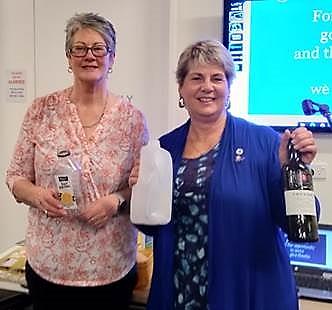Wheelie Bins: What Goes Where?

Averil Stevenson with President Janice
We were treated to an interesting and informative presentation by Averil, the Commercial & Compliance Manager at EcoCentral’s recycling plant.
Averil was born in Lyttelton and has two children of which one turned four today so we were very appreciative of her giving up her time to talk to us.
Part of her role involves talking to community groups because recycling is not that flash at the moment in greater Christchurch.
"We not only put stickers on wheelie bins but we also aim to educate the public" smiled Averil.
The Christchurch operation recycles 200 tons of recycling each day which comes from is as far away as Ashburton and the Mackenzie District.
“Post lockdown saw a huge increase in rubbish in the recycling, with over 50% of trucks now being failed as unable to be recycled” explained Averil. Two issues as a result of this are:
(1) Many items that could be recycled are now in landfill plus:
(2) There is not enough recycling available to meet our commitments to overseas processing factories.
They have also had issues recently getting processed recycling into destination countries as they have been badly affected by the Covid-19 virus and closed their borders.
To this day EcoCentral is turning way over 40% of all incoming loads. Because these go straight to landfill it has cost residents in the region of $1.2 million dollars to dump these loads.
To help combat this, lots of bins are being regularly checked for content with only 20% getting gold stars, 60% require information to better educate house owners and the remaining 20% are being used to put anything and everything in including dead animals, food waste etc.
These bins are not being collected and result in the owners going to ‘Strike 1’ status. If they fail again two weeks later they go to ‘Strike 2’. If they fail again, then the bins are taken away.
The processing of bins that are accepted is semi-automated. So: what’s in them?
“Paper is the most common item in the recycling bins but you need to be aware that we can't process anything smaller than an envelope so receipts, shredded paper etc. need to go in the red bin” explained Averil.
Glass bottles and jars are recyclable and most go into a product used in roading. The lids, though, must go in the red bin as otherwise the machine thinks they are a piece of paper. Steel, aluminium and aerosol containers can also be recycled but paint cans and tin foil need to go in the red bin.
With respect to plastic, the recycling centre’s goal is to recycle as much plastic as possible onshore. Rigid plastic bottles and containers are OK providing it is numbered 1, 2 and 5 only. All other plastics go in the red bin.
Standard milk plastic is also OK but squeezable containers (#4) and anything with number 7 on it cannot be recycled. Anything smaller than a yoghurt container or bigger than 3 litres also needs to go in the red bin as these are also not able to be processed within the recycling plant.
“Soft wrap film also needs to go in the red bin as our system thinks it is paper as well and this is what makes up most of our contaminants” shared Averil.
So, in summary, any plastics you can ‘scrunch’ go in the red bin.
To help ensure loads are safe, drivers are being increasingly asked to look at what goes in via amounted camera. “We are also going into schools to educate students and giving talks to groups such as yours” smiled Averil.
The company is are also looking at increasing recycling standardisation across New Zealand including ensuring that labels of “type” are more easy to see which will help bin owners choose the right bin for especially products that need to go in the red bin.
We thanked Averil for her informative talk and display of key items which will be a great help to ensure that we are putting the right products in the right bins.